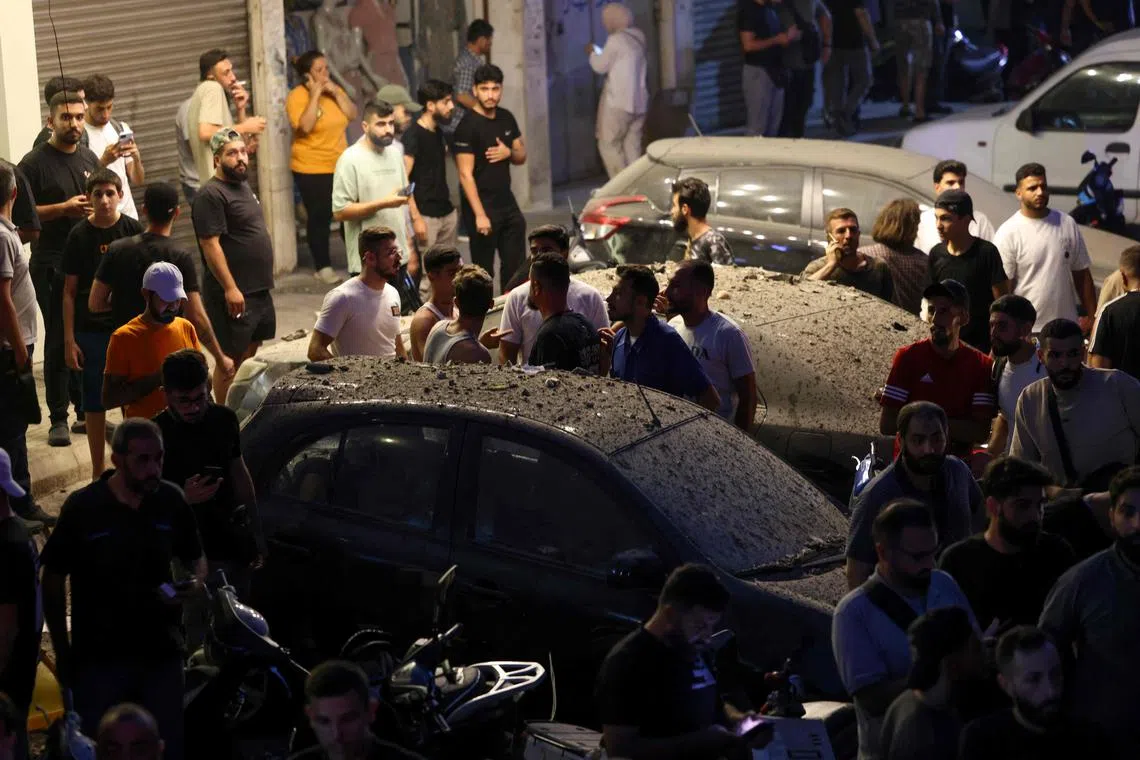Israel targets Hezbollah commander in Beirut strike; Lebanon says at least 1 killed, 35 injured
Sign up now: Get ST's newsletters delivered to your inbox

Bystanders looking on near the site of an Israeli military strike on the southern suburbs of Beirut, Lebanon, on July 30, 2024.
PHOTO: AFP
BEIRUT/JERUSALEM/MANILA – Israel believes an air strike on Beirut, Lebanon, on July 30 killed a senior commander of Lebanese armed group Hezbollah, Israel’s public broadcaster said, in retaliation for a cross-border rocket attack that killed 12 youngsters three days ago.
A loud blast was heard and a plume of smoke could be seen rising above Beirut’s southern suburbs – a stronghold of the Iran-backed Hezbollah – at 7.40pm (12.40am on July 31, Singapore time), a Reuters witness said.
Two unidentified sources told Israeli public broadcaster Kan that Israel assessed “the target of the strike” was killed.
The Israeli military earlier said the target was the Hezbollah militant responsible for a rocket strike on the Israeli-occupied Golan Heights
Two security sources in Lebanon earlier named the target as Hezbollah operations centre head Muhsin Shukr, who is also known as Fuad Shukr. They said he was critically injured in the attack around Hezbollah’s Shura Council in the Haret Hreik neighbourhood.
Lebanese Health Minister Firas Abiad told Reuters that the strike also killed another person and injured 35, three critically.
Hezbollah has denied involvement in the Golan attack, but said the group fired rockets at a military target in the Golan Heights. The killing of the young people prompted a high-level Western diplomatic flurry to avert a major escalation that could inflame the wider Middle East.
The Israeli military said it had issued no new instructions for civil defence in Israel, a possible indication that it did not plan further strikes immediately. Channel 12 TV quoted an unnamed official as saying Israel did not want an all-out war.
Israeli media reported that, depending on the Hezbollah reaction, the military considered the Beirut strike as concluding the response to the Golan Heights attack.
Mr Mohanad Hage Ali, an analyst with the Carnegie Middle East Centre, said Hezbollah would have to respond, perhaps by targeting a major city like Haifa on Israel’s northern coast.
There were about 25 rockets launched from south Lebanon into northern Israel throughout the day, the Israeli military said. Medics reported that a 30-year-old man in the cooperative community of Kibbutz Hagoshrim was killed.
Escalation concerns
Lebanese Foreign Minister Abdallah Bou Habib said on July 30 that his government condemned the Israeli strike and planned to file a complaint to the United Nations over it.
“We were not expecting them to hit Beirut and they hit Beirut,” he told Reuters, saying he hoped Hezbollah’s response would not trigger an escalation.
“Hopefully, any response will be proportionate and will not be more than that, so that this wave of killing, hitting and shelling will stop.”

Damage seen after what security sources said was a strike on the southern suburbs of Beirut, Lebanon, on July 30.
PHOTO: REUTERS
As diplomats sought to contain the fallout, US Defence Secretary Lloyd Austin said he did not believe a fight was inevitable between Hezbollah and Israel, though he remained concerned about the potential for escalation.
Hezbollah and Israel, which last fought each other in a major war in 2006, have been trading fire since the eruption of the Gaza war in October, after Hezbollah began firing at Israeli targets in what it says is solidarity with the Palestinians.
The hostilities have mostly been limited to the frontier region and both sides have previously indicated they do not seek a wider confrontation even as the conflict has prompted worry about the risk of a slide towards war.
Israel said it hit some 10 Hezbollah targets in south Lebanon overnight and killed one Hezbollah fighter – attacks that appeared to be in keeping with the pattern of the last nine months. Hezbollah confirmed one of its fighters was killed.
In January, Israel assassinated a senior exiled leader of Palestinian militant group Hamas in Beirut’s Dahiyeh suburb, prompting Hezbollah rocket attacks into northern Israel. REUTERS


